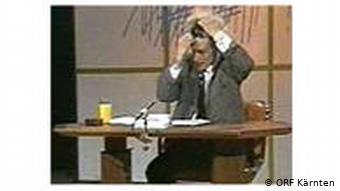This afternoon I thought of the German author Rainald Goetz, I’m not sure why I had to think of him. I was sitting in my mother’s garden, at least what used to be my mother’s garden, I was reading Arendt and suddenly there was Goetz.
Here is Adrian Nathan West who summarizes the first attempt at fame, provocation and performance art by Goetz:
‘In 1983, he created a name for himself by showing up to the Ingeborg Bachmann Prize ceremony with bristly, bleach-blond hair, a spiked leather cuff, and sneakers, then slicing open his forehead with a razor and dripping blood onto the pages of Subito, a satire centered on the Bachmann Prize itself, in which two critics fall asleep while a third scratches his balls beneath the table. He concluded by clamoring for “more excitement, way more commercials, Tempo cars, fashion-hedonism pop, and still more pop.”
His performance was instantly divisive. Fans proclaimed that German literature had found its next genius; others deplored what they saw as a tiresome publicity stunt. Goetz himself returned to his hotel to wash and change, and hurried off after the receptionist called to warn him that a psychiatrist and the police were on their way. Later that year, he published his first novel Insane, which describes the life of a young doctor named Raspe, the sufferings of his patients, his attempts at making peace with institutionalized psychiatry, and his depression and recovery after abandoning his profession for a life of writing, drinking, and clubbing.
Goetz knew his subject: apart from his studies, he had trained at the nerve clinic at the University of Munich and researched organic brain disturbances at the Max Planck Institute of Psychiatry. Moreover, the outsider Raspe’s struggle to integrate into the clinic system—and in a larger sense to conciliate with the German society of his time—was a longstanding concern of Goetz’s, foreshadowed in of one of his earliest published pieces, the 1978 essay “He is Making His Way.” There, he recounted the difficulties his non-conformism occasioned, his unhappiness with the dreariness of university life, his disillusionment with the range of readymade ideologies, and the solace offered by literature. When he applied for a post as a schoolteacher and was told there were no vacancies, only to discover his political beliefs were the true cause of his rejection, he asked: “Is there a point at which such experiences transcend the private and become exemplary for a climate, for a societal tendency?”’
Read the article here.
I saw his play ‘Krieg’ (War) in the late eighties in Amsterdam, after I had tried to read it. It made a huge impression on me, even though I’ve never been able to read all of the text. I would even say that I was influenced by ‘Krieg’, at least before I wrote my first novel. By then I had reached the conclusion that the window of opportunity for German experimentalism had closed. Following Goetz was a sure route to obscurity, nothing wrong with obscurity of course, but I was thirsty for something else.
A few years ago a friend gave me a novel by Goetz, I haven’t read it. Maybe this afternoon was a sign.
